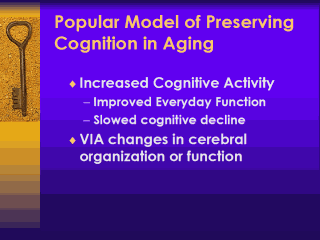 |
Now I think that there is a popular model of how to do this
and as we look at some of the titles of the popular literature that are out there I think
you will get a sense of this. The popular model of preserving cognition as people age
seems to be this: I will increase my cognitive activity in everyday life, or through
something, and that will improve my everyday function and it will slow my cognitive
decline Ė maybe it will even prevent me from getting Alzheimerís disease. And how will
those two things occur? It will occur because Iíll have changes in the cerebral
organization or the function of my brain or thinking. And when I meet older people, and as
part of my job I meet a lot of older people, who feel threatened or legitimately have had
changes in cognition, this is exactly the model that their families especially and often
times their self espouse. And I am beginning to see this in the popular literature. So
Iím not proposing that this is a model for what is happening but Iím remarking that
this seems to be what people are thinking about. |
